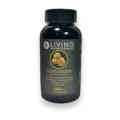Lion’s Mane Mushroom for Brain Health

Latin Name
Total Polysaccharides %
Beta Glucans %
Starch
Mycilium or Fruiting Bodies?
Substrate
Extract Ratio
Sustainably Grown
Amount per Serving
What is Lion’s Mane?
Lion’s mane is an edible medicinal mushroom known for its many nutrients and health promoting effects [1]. It’s also known by many other names such as Hericium erinaceus, Yamabushitake (Japanese), Monkey’s Mushroom, and Hog’s Head Fungus [2].
Traditional Chinese Medicine (TCM), has used this mushroom as a brain tonic to improve brain power, enhance focus during meditation, help with relief of stomach discomfort and for prevention of oxidative stress related disorders such as cancer, diabetes, and heart disease [3].
Lion’s mane contains not only polysaccharides, beta glucans, vitamins and minerals; but also potential bioactive compounds such as erinacines, hericerins, steroids, alkaloids, and lactones [2].
Several clinical studies have recorded the potential health benefits of lion’s mane; such as anti-cancer, hypolipidemic, antioxidant, anti-microbial, anti-hypertensive, and anti-diabetic.
This mushroom is also reported as having both wound healing properties and neuro-protective components [4]. While human research continues on these health benefits, it cannot be denied that lion's mane extract is an amazing supplement that promotes a healthy lifestyle -for both body and brain!
Whether you want to improve your mental health, balance your blood sugar, or improve your digestion, Lion's Mane is a great choice that has been used for centuries.
Lion’s Mane protects against Dementia
Aging diseases of the nervous system, such as dementia, Alzheimer's, brain tumors and others represent a major global public health crisis, as there are currently no cures. Thus, these diseases have attracted the interest of the leading pharmaceutical companies, who continue to look for possible cures.
How does lion’s mane works?
Bioactive substances isolated from Hericium erinaceus, including its mycelia and fruiting bodies, were discovered to increase the expression of neurotropic factors like nerve growth factor (NGF).
Nerve growth factor is required for neuronal cell development, maintenance proliferation, and organizing the function of cholinergic neurons of the basal forebrain complex (BFC) of the central nervous system of which neurons degrade as dementia progresses [1].
In the hippocampus, extracts of Hericium erinaceus were observed to enhance both NGF mRNA and protein expression, suggesting that the bioactive substances in Hericium erinaceus extract can penetrate the blood brain barrier, resulting in hippocampus regeneration.
Clinical evidence that suggests the effectiveness of lion’s mane on cognitive impairment diseases:
In a clinical study, about 30 Japanese patients between the ages of 50 and 80 were diagnosed with mild cognitive impairment. The revised Hasegawa Dementia Scale was used to assess cognitive function in the preliminary examination, with selected patients scoring from 22 to 25 out of 30 on the scale. They used Hericium erinaceus as the test food for test group for 14 weeks and 4 weeks of follow up observation. The results show that Hericium erinaceus group increased the score dependent on the intake period, showing significant differences compared with the placebo group on the cognitive functions scale. So, Hericium erinaceus can be considered a healthy supplement for the prevention of dementia without side effects. Hericenones may relate this effect to the promotion of nerve growth factor. [5].
In addition, an animal study examined the effect of the lion's mane mushroom on amyloid peptide β (25-35) induced impairment of memory and learning in mice. The researchers fed mice on a test diet containing a 5% dried lion’s mane mushroom for 23 days and examined their behaviour using the Y-maze test and a recognition test. Study results show that lion's mane prevents cognitive impairment caused by β-amyloid administration (25-35) and may be a promising treatment for cognitive impairment diseases [6].
Lion’s mane Mushroom Nutritional Composition:
Every 100 g of Hericium erinaceus fruiting body contains:
Protein: <5%
Carbohydrates: 61.1%
Fats: 5.1%
Total polysaccharides: 55%
Beta Glucans: 50%
Water: 6.2%
The content for total amino acid derived bio-active compounds in fruiting bodies:
γ-amino butyric acid (GABA): 42.9 μg/g
Ergothioneine: 630.0 μg/g
Lovostatin: 14.4 μg/g
Besides that, the fruiting body reported containing various amounts of macronutrients and trace elements such as calcium, chromium, cobalt, copper, iron, magnesium, manganese, molybdenum, phosphorus, selenium, sodium, sulfur, and zinc.
Living Nutritionals 10:1 Lion’s Mane Extract
As a dietary supplement, the prescribed dose for adults is 2-3 capsules daily with or without food. Keep it in a cool, dry place.
Precautions: Keep out of the reach of children. Consult a physician if you are pregnant or nursing; have or had a medical condition or are taking prescription drugs.
Product qualification: USDA, Non-GMO, Gluten free, Cruelty free, HALAL, HACCP certified, ISO 2200.
10 Additional Health Benefits of Lion’s Mane 10: 1 Extract
- Increases oxygen utilization
- Mood enhancer – depression, anxiety, mental health
- Athletic performance booster
- Antioxidant, Anti-inflammatory
- Antibiotic properties
- Used for centuries in traditional medicine and known to be safe
- Promotes heart health
- Increases lung function
- Helps build muscles
- Improves physical energy
